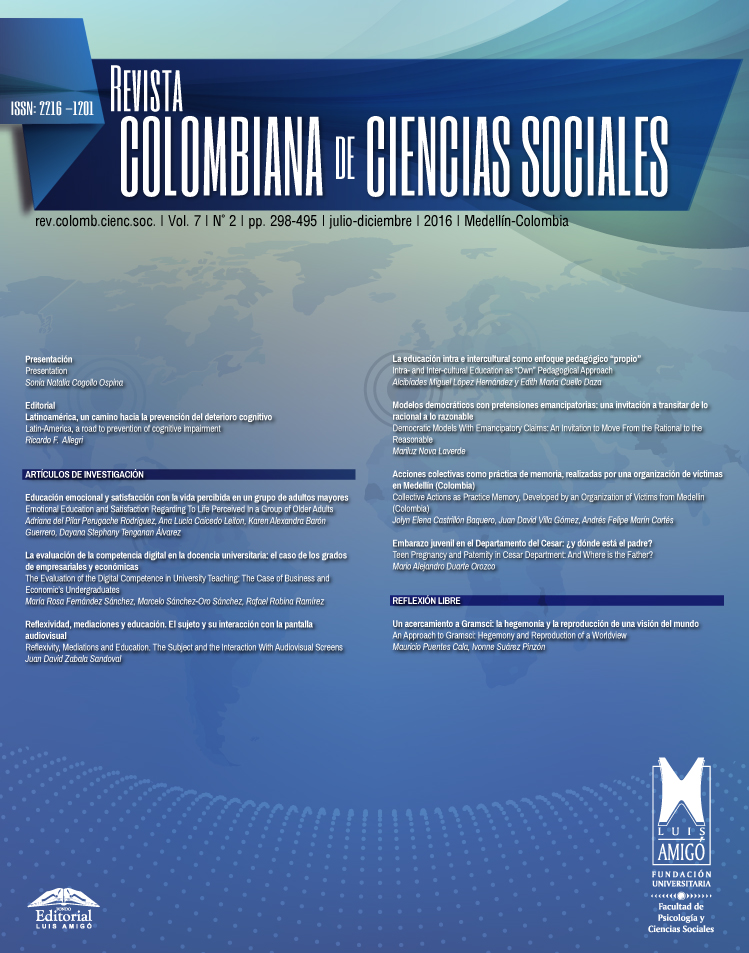Modelos democráticos con pretensiones emancipatorias: una invitación a transitar de lo racional a lo razonable
DOI:
https://doi.org/10.21501/22161201.1773Palavras-chave:
Alienación Social, Democracia, Justicia socialResumo
Los grandes debates suscitados por Teoría de la justicia de John Rawls determinaron lo que los analistas han denominado el giro político de su pensamiento, el cual se materializa en el Liberalismo político. Allí, Rawls consolida un modelo de democracia consensual, controvirtiendo y apartándose del liberalismo doctrinario. La hipótesis a desarrollar en este documento es que un análisis del paso de la concepción de un agente liberal individualista de Teoría de la justicia a la concepción política de persona de Liberalismo político favorece una lectura crítica de la posterior eclosión de teorías de la democracia como instrumento de emancipación, toda vez que pone de presente el carácter enajenante de la idea de racionalidadque ha conducido a la autodestrucción del proyecto de la Ilustración como ideario emancipatorio. Lo anterior, además, conduce a la reflexión respecto de lo que constituye un régimen justo, cuestión que cobra la mayor importancia en la coyuntura de búsquedas de salidas negociadas al conflicto armado en Colombia. © Revista Colombiana de Ciencias Sociales.
Downloads
Referências
Alexy, R. (1994). La validez del derecho. En El concepto y la validez del Derecho (pp. 87-122). Barcelona: Gedisa.
Bohman, J. (1996). What is public deliberation? A dialogical account. In Public Deliberation (pp. 23-70). Cambridge: MIT.
Buchanan, J. (1975). The Limits of Liberty. Chicago: University of Chicago.
Dubiel, H. (1997). El dispositivo simbólico de la democracia. En H. Dubiel, G. Frankenberg, & U. Rödel, La cuestión democrática (pp. 137-192). Madrid: Huerga y Fierro.
Fraser, N. (1997). Iustitia interrupta. Bogotá: Siglo del Hombre.
Fraser, N. (2008). Escalas de justicia. Herder: Barcelona.
Fraser, N., y Honneth, A. (2006). ¿Redistribución o reconocimiento? Madrid: Morata.
Habermas, J. (1998). Facticidad y validez. Madrid: Trotta.
Habermas, J. (1999). La inclusión del otro. Estudios de teoría política. Barcelona: Paidós.
Hardt, M. y Negri, A. (2001). Imperio. Bogotá: Desde Abajo.
Honneth, A. (1997). La lucha por el reconocimiento. Barcelona: Crítica.
Honneth, A. (2009). Patologías de la razón. Buenos Aires: Katz.
Horkheimer, M. (2002). Crítica de la razón instrumental. Madrid: Trotta.
Horkheimer, M. y Adorno, T. (1998). Dialéctica de la Ilustración. Madrid: Trotta.
Luhmann, N. (1994). Teoría política en el Estado de bienestar. Madrid: Alianza.
Luhmann, N. (1998). Sistemas sociales. Barcelona: Anthropos.
Mejía Quintana, Ó. (enero-junio, 2010). Modelos alternativos de democracia deliberativa. Una aproximación al estado del arte. Co-herencia, 7(12), 43-79. Recuperado de http://www.redalyc.org/pdf/774/77416993002.pdf
Mouffe, C. (1996). Radical democracy or liberal democracy. In D. Trend (Ed.), Radical Democracy (pp. 19-26). New York: Routledge.
Negri, A. y Hardt, M. (2004). Multitud. Barcelona: Debate.
Rawls, J. (1995). Teoría de la justicia. México: Fondo de Cultura Económica.
Rawls, J. (2002). La justicia como equidad, una reformulación. Barcelona: Paidós.
Rawls, J. (2006). Liberalismo político. México: Fondo de Cultura Económica.
Schaff, A. (1997). La alienación como fenómeno social. Barcelona: Crítica.
Sen, A. (1976). Elección colectiva y bienestar social. Madrid: Alianza.
Torres, J. (2004). Luhmann: la política como sistema. México: Fondo de Cultura Económica/Universidad Iberoamericana/ UNAM.
Wellmer, A. (1996). Finales de partida. Madrid: Cátedra.
Young, I. M. (1998). Political theory: an overview. In R. Goodin & H. D. Klingemann (Eds.), Political Science (pp. 479-502). Oxford: O.U.P.
Downloads
Publicado
Como Citar
Edição
Seção
Licença
La revista y los textos individuales que en esta se divulgan están protegidos por las leyes de copyright y por los términos y condiciones de la Licencia Creative Commons Atribución-No Comercial-Sin Derivar 4.0 Internacional.









